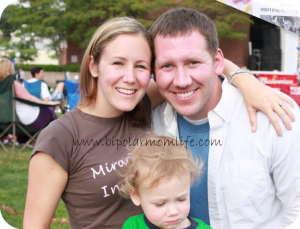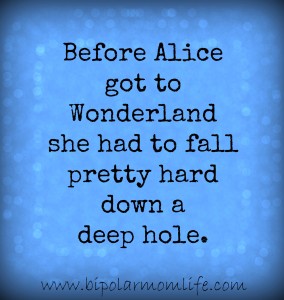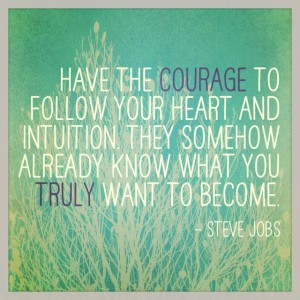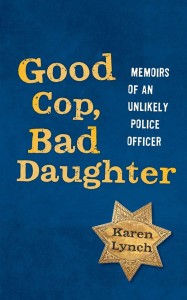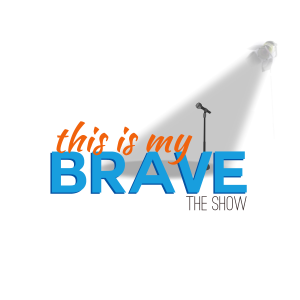 Photo Credit: yyellowbird via Compfight cc
Photo Credit: yyellowbird via Compfight cc
Our bedroom door creaked slowly open at 6:35am this morning and my little man crawled under the covers next to me while my husband finished getting dressed for work. As I felt the chill of little toes brush my warm legs, I thought back to this same day, five years ago, when my mania had reached the breaking point.
I had begun to cross the threshold, going from highly manic to the inevitable psychosis, when my husband took matters into his own hands and called 911 for help.
What a stark comparison to today, I thought, as I reached into my sock drawer to fish out my psych ward socks. I pulled them on this morning as a way of honoring my past, while at the same time recognizing how far I’ve come and how I don’t ever want to go back.
~~~~~~~~~~~~~~~~~~~~~~~~~~~~~~~~~~~~~~~~~~~~~~~~~~~~~~~~~~~~~~~~~~~~~
If your father were having a heart attack, or symptoms consistent with those of a heart attack, you would rush him to the hospital where he would receive treatment. If your child had a 104 fever and was gravely ill but refused to take any medicine, you would call your pediatrician who would tell you to rush the child to the Emergency Room where he would receive medical assistance.
But if someone you loved were experiencing a mental health crisis and needed to see a psychiatrist or be involuntarily committed to a psychiatric facility to receive treatment, you wouldn’t believe the obstacles you have to surpass in order to get them the care they need to get well.
I know, because my family and I plunged head first into these roadblocks in the U.S. mental healthcare system five years ago when I was hospitalized for postpartum psychosis after the birth of my first child in 2008. Writing about this experience was something I wanted to do in order to educate people about the policies surrounding access to mental health care in the state of Virginia. {The laws vary by state. A good resource with links to studies and comprehensive information is MentalIllnessPolicy.org.}
In researching my mental illness and the treatment I received during my hospitalization, I requested copies my medical records from the hospital. I’d like to take you back to the week of October 22nd, 2008, approximately four weeks after I had given birth to my son. Belly still swollen, breasts leaking milk, I lost touch with reality during the early hours of that cool fall morning, but remained silent about my growing sense that this would be my last day on earth.
I was terrified of being taken away from my baby even though there was a little voice in the far corner of my mind urging me to go. I just didn’t want to listen.
That morning my husband knew from my past two manic episodes that I needed to be taken to the hospital. He called his mom and sister to come over and help, as we had been through this before and he knew my erratic manic behavior would require more than one person assisting in the effort to get me ready to be transferred. His next call was to dial 911, where he explained to the dispatcher that I had a bipolar diagnosis, was off my meds because of having just had a baby, and was now rapidly deteriorating and we were in need of help to get me to the hospital. He then called my psychiatrist, leaving her a message to tell her what was going on. And lastly he called my parents in Florida to alert them as well.
I remember being on the phone with my Dad while sitting on a chair in the kitchen, talking to him on speaker phone while the two female police officers who had been dispatched to our house were standing right before me. He was pleading with me to go with them. I don’t recall much, other than being afraid. I don’t know exactly how much time passed, but eventually they were able to take me, in handcuffs, under a Temporary Detention Order (TDO), to our local hospital for an evaluation.
I was clearly manic to the point of psychotic. It was well documented in the detention order paperwork that I had reported hearing voices and seeing ghosts in the baby’s room. My husband had told the officers that I had only slept 3-4 hours a night for the four nights leading up to his call for help. His sleep estimates were correct - it had been the weekend of our son’s baptism and I was trying to prepare for out-of-town guests along with getting everything ready for the party we were hosting. On top of learning to care for our new baby and suppressing the mania that I had felt since the night he had been born, it all caught up to me.
The Temporary Detention Order allowed my husband to have me sent to the hospital for an assessment. My husband was my Petitioner - the person asking that I be involuntarily committed. We were led to an empty hospital room where I was handcuffed to the metal bars of the hospital bed. My husband stayed by my side the entire time. The nurses assessed me and it was determined that there was substantial likelihood that, as a result of my mental illness, in the near future I would suffer serious harm due to a lack of capacity to protect myself from harm. I refused all meds in the Emergency room and I met the criteria for involuntary admission to a psychiatric ward of the hospital, not to exceed a 30-day stay.
I was taken by police car, still handcuffed, to our local hospital’s geriatric psychiatric ward, the nearest facility with a bed available. By the time the bed had become available, it was late at night and I remember being terrified upon entering the facility because of the Halloween decorations festively decorating the glass doors which were pulled open for me. My throat closed and I struggled to breathe, leaning all my weight back, attempting to keep them from guiding me in. They eventually coaxed me in and a young attendant began working with me to get me through the intake process. I remember her arms, covered with tattoos. Her name was Jenny.
They tried to give me drugs to force me to sleep, but my mania was so rampant and I continued to refuse oral medication, so I was given an injection to tranquilize me and my body succumbed to the rest it so desperately needed. I woke groggy, and still very ill.
The Temporary Detention Order meant I could be held involuntarily for one to five days, until a commitment hearing could be held. I was admitted the night of October 22nd, and my commitment hearing was scheduled for 9am on the 24th.
After only thirty-six hours of psychiatric care, I was still extremely sick and my mania was apparent to everyone close to me. But the chemical imbalance that was still working itself back to balanced with the help of the meds and forced rest, wasn’t severe enough to present me as a threat to myself or others during the trial, and despite my family’s strong arguments that I was not well enough to go home and care for myself, let alone a newborn, the judge still deemed me well enough to not be held against my will.
I was free to go home. Case dismissed.
My father spoke with the judge immediately following the trial’s conclusion. He was shocked and couldn’t believe the judge was going to send me home in the condition I was in. My father then asked if they (my family) were able to convince me to stay in the hospital, voluntarily, would I be able to stay?
The judge informed him that yes, I would of course be able to stay on a voluntary basis, but on the same token, I’d be able to sign myself out at any time.
This news was plenty good enough for my family and they immediately began encouraging me to stay and rest, so that I’d be able to return to my newborn baby in a much clearer state of mind. They knew that with just a few more days of treatment and solid sleep, I’d be in a significantly better place to where I could continue to see my outside psychiatrist and work on making a full recovery.
Fortunately, I was well enough to rationalize their concern for me and that was all it took to convince me to sign myself in. I stayed for three more days. My husband and dad came to visit me every day to check on my progress. They used my somewhat still disoriented state to their advantage as they were able to remind me each day that “we all needed to be in agreement that it was the right time for me to go home,” and I was too fragile mentally to process what had happened in the hearing so I followed their lead. I had signed myself in to stay and could leave when I was ready, but I didn’t really comprehend it all at the time.
I called home daily to check on my baby and asked them to bring pictures to the hospital. He changed so much in that week that I missed. His wispy brown hair on top fell out, so he had a bald head with only hair on the sides and around to the back. I cried at a picture they brought me of him smiling on his back laying on a blue and green striped baby blanket. Desperate to get back to my son, I eagerly took my meds each day and night, and did my best to be a model patient.
I signed myself out of the hospital on the 27th, after a 5-day stay, and walked into the kitchen of my house where my mom was stirring a pot of homemade chicken noodle soup cooking on the stove. I made my son a bottle of formula and sat on the couch to learn the art of bottle feeding him after having spent a month perfecting breastfeeding. I will never forget that moment. While feeding him and gazing into his eyes I silently vowed that I would do everything in my power to stay healthy for him. I never wanted to be taken away from him again.
Some people might say that involuntary commitment laws take away a person’s constitutional right to freedom. I completely disagree.
My family sought help for me because they knew I was so severely ill. The system initially determined I was a threat to myself, but the judge at the commitment hearing determined that was no longer the case. Situations like this happen all the time due to the current state of our mental health system and unfortunately, these holes in the system are what contribute to tragedies like Virginia Tech, Sandy Hook or the Navy Yard shootings. It’s the subjective “threat to themselves or others” which is determined by someone who has never met the mentally ill person, which is what needs to change.
People who are aware of family or friends who have mental health issues (and we all know someone given the statistic of 1 in 4 Americans living with a mental illness) need to be more proactive when they sense a change in someone’s behavior. By paying attention to the fragile mental states of people within our own environments, we will be able to push for help before it’s too late. The mental health laws need to be reviewed and modified to permit family and friends to have the ability to have people in trouble involuntarily committed for longer periods of time, so they are better able to make bigger strides towards recovery during the time in which they are under the hospital's psychiatric care. Until this done, we will continue to see more tragedies.
~~~~~~~~~~~~~~~~~~~~~~~~~~~~~~~~~~~~~~~~~~~~~~~~~~~~~~~~~~~~~~~~~~~~~
On this fifth anniversary of my TDO and subsequent voluntary psychiatric commitment, I’m able to smile at my son’s insistence on dressing up as a ghost for Halloween. Five years ago I was not taking my medication and therefore went through hell, reportedly saw ghosts, and thought the world was coming to an end. But today I’m cutting eye holes out of a white sheet to dress my little man up on the last day of this month. A costume which serves as a gentle reminder of my past, while allowing me to appreciate the invisible challenges which inevitably lie ahead.
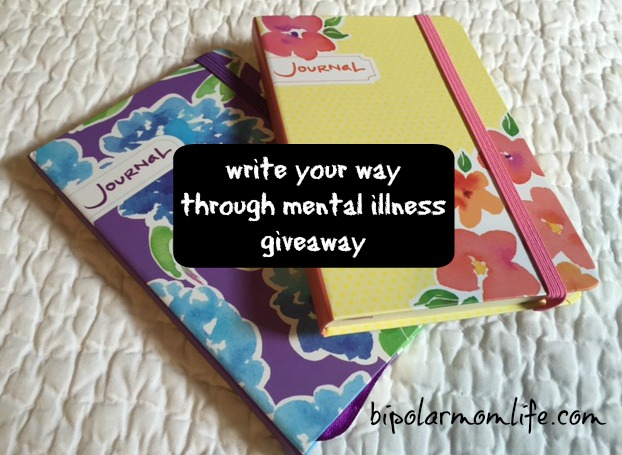 I've been writing in journals ever since I was a tween. Back then they were sparkly little diaries with the lock and key protecting all the secrets inside. I'd write about life and love, about boys I thought I'd fallen in love with but who didn't actually love me back. Or about arguments with my parents or my friends, trying to justify my side of the story.
I've been writing in journals ever since I was a tween. Back then they were sparkly little diaries with the lock and key protecting all the secrets inside. I'd write about life and love, about boys I thought I'd fallen in love with but who didn't actually love me back. Or about arguments with my parents or my friends, trying to justify my side of the story.



